Recent Fire Damage Posts
Cigarette Fire Safety
9/20/2023 (Permalink)
We recently had an emergency call come in where the homeowner experienced a large fire loss due to a cigarette. We want to ensure smokers in the Edgewater area are smoking safely and understand the risks associated with smoking involving their house. It is important for smokers to know the steps they can take to keep themselves and their families safe from fire. Here are some tips from SERVPRO of Edgewater/Deale-Churchton/Lothian that could help protect you or someone you know who smokes.
Smoke outside. Many things in your home can catch on fire if they come in contact with some like cigarette ashes.
Put cigarettes out ALL THE WAY. Do this every time. Do not walk away from lit cigarettes or other smoking materials.
Be alert. Do not smoke after taking medicine that makes you tired or drowsy.
Never smoke around medical oxygen. Medical oxygen can explode if a flame or spark is near, even if the oxygen is turned off.
Never smoke in bed. Mattresses and bedding can catch on fire easily. People also fall asleep often with lit cigarettes.
Put your cigarette out in an ashtray or bucket with sand. Use ashtrays with a wide base so they will not tip over and start a fire.
Smoking safely and knowing what to do in the event of an emergency could mean the difference between limiting damage to your home and losing everything. If you experience a fire loss, call SERVPRO of Edgewater/Deale-Churchton/Lothian at 410-867-3590.
Types of Smoke and Smoke Remediation
9/21/2022 (Permalink)
In the restoration business, SERVPRO of Edgewater/Deale-Churchton/Lothian gets called to building fires on a regular basis. Did you know that smoke damage is treated differently? There are 4 main types that we treat:
- Wet Smoke. (Plastic and Rubber) Low heat, smoldering, pungent odor, sticky, and smeary. Smoke webs are more difficult to clean.
- Dry Smoke. (Paper and Wood) Fast-burning, high temperatures; heat rises; therefore, smoke rises.
- Protein Fire Residue. (Produced by evaporation of material rather than from a fire) Virtually invisible, discolors paints and varnishes, extreme pungent odor.
- Fuel Oil Soot. (Furnace puff backs) While “puff backs” can create havoc for homeowners, SERVPRO of Annapolis/Severna Park can, in most cases, restore the contents and structure quickly.
- Other Types. (Tear gas, fingerprint powder, and fire extinguisher residue) Special loss situations require special care.
SERVPRO of Edgewater/Deale-Churchton/Lothian technicians are IICRC trained to handle even the toughest of losses. The type of smoke may greatly affect the restoration process, but trust professionals to make it “Like it never even happened.”
The PASS Technique
3/1/2022 (Permalink)
At SERVPRO of Edgewater/Deale-Churchton/Lothian, we restore buildings and contents after fires have occurred. We encourage you to train your employees on some basic fire safety techniques on an annual basis.
Here’s a quick list of some techniques you should use.
Fire extinguisher training should be done on an annual basis, at least, and should also be part of the initial training for new employees.
The P.A.S.S Technique
If employees aren't confident they can safely put out a fire, they should evacuate instead. The acronym P.A.S.S. helps employees remember each step of using an extinguisher to reduce fire damage.
- Pull the pin. Find the pin at the top of the canister and pull it out to break the tamper seal.
- Aim the nozzle at the base of the fire. When the source of water is doused, the flames should die down.
- Squeeze the handle to release the pressurized chemicals inside the canister.
- Sweep the spray from side to side, maintaining your focus at the base of the fire.
After working through the steps, keep your eye on the area. If flames reappear, repeat steps 2 to 4.
Annual Fire Response Drills
- Use the following steps in case of a fire (and during yearly drills.)
- Pull the fire alarm and alert the fire department.
- Protect the designated evacuation path. If fire, heat, or smoke threatens to come between employees and the exit, personnel should evacuate instead of fighting the fire.
- Choose an appropriate extinguisher.
- Complete the P.A.S.S. technique.
- Observe the location of the fire to catch any flames that may reignite.
- Evacuate immediately if the fire is too big, if the air isn't safe to breathe, if the room is too hot or smoky, and/or if the evacuation path is compromised.
- Once the ability to use the fire extinguisher has been mastered and employees have been trained in the fire response routine, schedule opportunities for employees to practice their responses to a fire.
Practice Safety
It doesn't take long for a kitchen fire to pop up in a restaurant or flames to appear in an industrial setting. Protect your employees with training on how to use a fire extinguisher and regular drills in fire safety techniques.
Cigarette Fire Safety
1/6/2022 (Permalink)
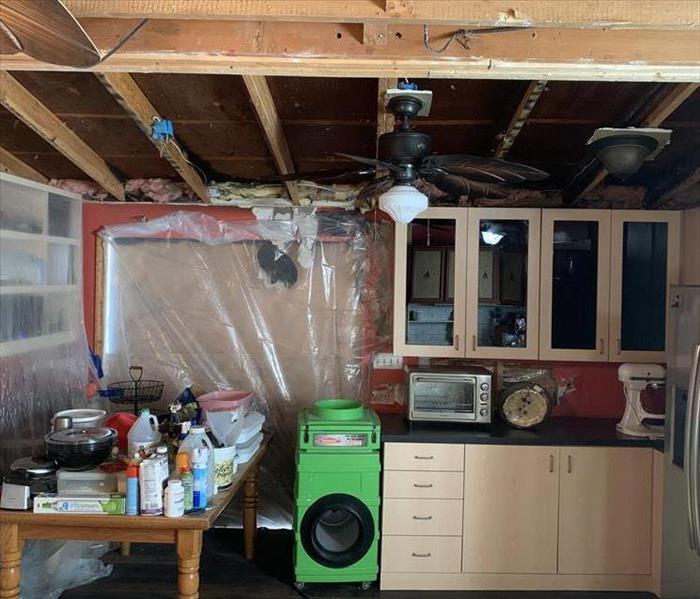 This homeowner suffered a large fire loss due to a cigarette.
This homeowner suffered a large fire loss due to a cigarette.
We recently had an emergency call come in where the homeowner experienced a large fire loss due to a cigarette. We want to ensure smokers in the Edgewater area are smoking safely and understand the risks associated with smoking involving their house. It is important for smokers to know the steps they can take to keep themselves and their families safe from fire. Here are some tips from SERVPRO of Edgewater/Deale-Churchton/Lothian that could help protect you or someone you know who smokes.
Smoke outside. Many things in your home can catch on fire if they come in contact with some like cigarette ashes.
Put cigarettes out ALL THE WAY. Do this every time. Do not walk away from lit cigarettes or other smoking materials.
Be alert. Do not smoke after taking medicine that makes you tired or drowsy.
Never smoke around medical oxygen. Medical oxygen can explode if a flame or spark is near, even if the oxygen is turned off.
Never smoke in bed. Mattresses and bedding can catch on fire easily. People also fall asleep often with lit cigarettes.
Put your cigarette out in an ashtray or bucket with sand. Use ashtrays with a wide base so they will not tip over and start a fire.
Smoking safely and knowing what to do in the event of an emergency could mean the difference between limiting damage to your home and losing everything. If you experience a fire loss, call SERVPRO of Edgewater/Deale-Churchton/Lothian at 410-867-3590.
How does candle smoke permeate?
12/13/2021 (Permalink)
The cheapest and most widely used candle is made of paraffin—which is derived from petroleum. When burned, it releases a toxin called toluene, which has been found to cause DNA strand breakdown, affecting the nervous system.
When you are burning a candle, you are essentially vaporizing the liquid wax into a gas that is flammable. This vapor can then be used as fuel for the candle flame. It is this vaporized wax that fuels all candle flames used with conventional wax-based candles.
Smoke from candles is actually soot. Smoke is just soot and other particulates carried on the hot air rising off the flame. When you put the top on a jarred candle and trap the smoke, it cools. And, the particulates in the candle settle onto the candle and the inside walls of the jar.
Fireplaces, cigarettes and the burning of candles can all result in soot stains on walls. Though soot collects on other surfaces in the home, soot stains are easy to spot on light-colored walls. Aside from being unattractive, soot can cause health effects.
In general, candles won’t set off your smoke alarm. However, they can cause a fire. SERVPRO of Edgewater/Deale-Churchton/Lothian has provided fire damage remediation and reconstruction to several properties where candles were the cause of the fires.
Why Your Christmas Tree Might Be a Fire Hazard
11/4/2021 (Permalink)
The holidays can be a somewhat dangerous time. Did you know that emergency rooms typically treat an estimated 14,000 holiday decorating related injuries, an average of about 240 injuries per day in November and December? These injuries ranged anywhere from falling off ladders while hanging lights to lacerations from broken glass in ornaments. A strong number of these cases are often Christmas tree related incidents. Here are some ways you can avoid Christmas tree accidents this winter:
Ensure that your live tree is fresh and that the needles are hard to pull of the branches. This indicates that your tree is fresh and not dried out. Another indicator is the tree trunk itself. The trunk should be sticky and if you tap the tree on the ground, only a few needles should fall off.
Keep your tree away from any heat source in your home. This includes fireplaces, vents, radiators, and space heaters.
Be sure to check the water level daily. Check the water level in your tree stand and make sure your tree is fresh. A heated room can quickly dry out a tree, making it a dangerous fire hazard.
Inspect your lights and ornaments before putting them on your tree and plugging them in. Check for any frayed wires or broken or missing lights.
SERVPRO of Edgewater wants you and your family to safe this upcoming holiday season. Avoid any incidents involving your Christmas tree this winter by using these tips!
The First 48 Hours After a Fire
10/13/2021 (Permalink)
The first 48 hours after a fire can make the difference in restoring versus replacing your damaged property and personal belongings. SERVPRO of Glen Burnie can help prevent fire damage from creating long-term problems for your personal belongings. We provide prompt response with professional services ranging from fire, smoke and soot removal to contents claims inventory and document restoration. Our professionals will help ensure that your belongings and memories are restored to previous conditions when possible.
Before we arrive on site, here are some actions you can take before help arrives:
- Limit movement in the home to prevent soot particles from spreading
- Place clean towels or old linens on rugs, high traffic areas, and upholstery
- Coat any chrome trim or faucets with petroleum jelly or oil
- Place aluminum foil or wood blocks between furniture legs and wet carpet
- Do NOT wash any walls, painted surfaces, and carpet
- Do NOT clean any electrical equipment
- Do NOT send any clothing items to a dry cleaner
Before you risk any further damage by attempting to clean any damaged items yourself, call our SERVPRO professionals to help make fire damage “Like it never even happened.”
Does Your Renter’s Insurance Cover You In Case of a Fire?
9/22/2021 (Permalink)
Does your insurance cover you and your belongings in case of a fire? With Fire Prevention Week approaching, it is very important to prepare for the unexpected. However, it is even more important to be prepared by knowing what your renter’s insurance does and does not cover.
Your insurance policy can help protect your family if a fire should affect your home. Knowing what your policy does and how it covers you is crucial.
Here at SERVPRO of Edgewater Edgewater/Deale-Churchton/Lothian, we want to give you some insight on a few ways renter’s insurance can help protect you and your wallet:
- Protect personal property – Your landlord’s insurance will most likely cover the building and items belonging to the landlord, but your items are not included in the coverage. You will need a policy to provide replacement value of personal property lost
- Prevent financial destruction from liability – Ensure that your insurance policy includes protection for your personal belongings in case you accidentally start the fire.
- Supply money for accommodation - Verify that your renter’s policy includes this coverage which provides for hotel fees or the expense of relocation. A disaster that occurs at your home can help you pay for somewhere else to live if the space becomes uninhabitable.
Renter’s insurance is relatively affordable, costing around $30 a month. This coverage can protect your belongings no matter whether they are damaged or stolen. Remember, flood damage requires a separate coverage, but damage done to your home due to a fire or other disaster is usually covered. It is up to your property owner to have the adequate coverage for the building and any additions that may be included.
If you or someone you know has recently experienced fire damage to your property, contact SERVPRO of Edgewater Edgewater/Deale-Churchton/Lothian to help prevent fire damage from creating long-term problems.
Do You Have a Home Evacuation Plan?
2/28/2021 (Permalink)
Fire can spread rapidly through your home, leaving you with as little as one or two minutes to escape safely once the smoke alarm sounds.
If a fire breaks out in your home have you established an evacuation plan? Pull together everyone in your household and make a fire escape plan. How will you exit and where will you meet are both key aspects that should be discussed.
A couple tips to remember; stay low to avoid smoke, fumes and super heated gases. Close doors as you leave to confine fire as much as possible. Most importantly if a fire occurs in your home, GET OUT, STAY OUT and CALL FOR HELP.
SERVPRO of Edgewater/Deale-Churchton/Lothian technicians are IICRC trained to handle even the toughest of losses. The type of smoke may greatly affect the restoration process, but trust professionals to make it “Like it never even happened.”
How Does Smoke Permeate?
1/6/2021 (Permalink)
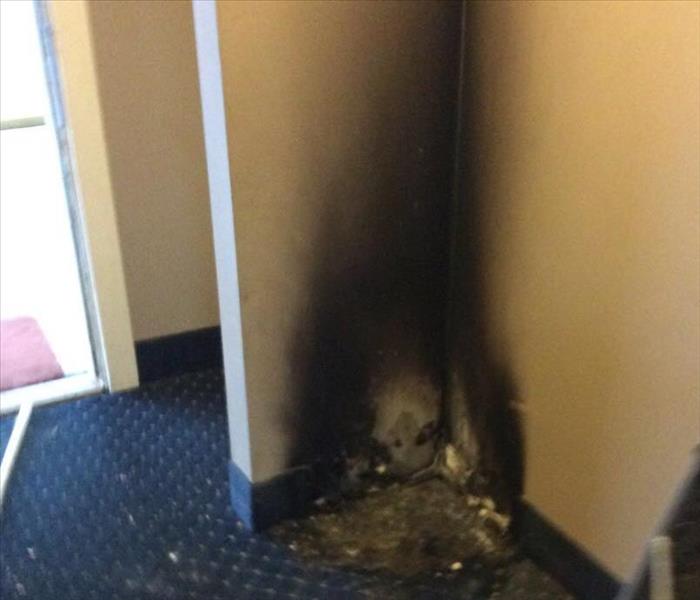 Fire Damage
Fire Damage
The damage to your Edgewater home or business following a fire is complicated due to the unique behavior of smoke. There are two different types of smoke: wet and dry. As a result, there are different types of soot residue after a fire.
Before restoration begins after any fire, our SERVPRO of Edgewater/Deale-Churchton/Lothian professionals will survey the property to determine the impact from the fire, smoke, heat, and moisture. The soot will be detested to determine which type of smoke damage occurred. Based on the results, our IICRC certified technicians perform the proper cleaning method.
Smoke can penetrate various cavities withing a structure, causing hidden damage and odor. Our team will investigate how far smoke damage may have spread. Here are some facts about how smoke permeates:
- Hot smoke migrates to cooler area and upper levels of a structure.
- Smoke flows around plumbing systems, seeping through the holes used by pipes to go from floor to floor.
- The type of smoke may greatly affect the restoration process.
If your Edgewater property suffers fire or smoke damage, contact us. We strive to make it “Like it never even happened.”
Types of Smoke and Smoke Remediation
12/9/2020 (Permalink)
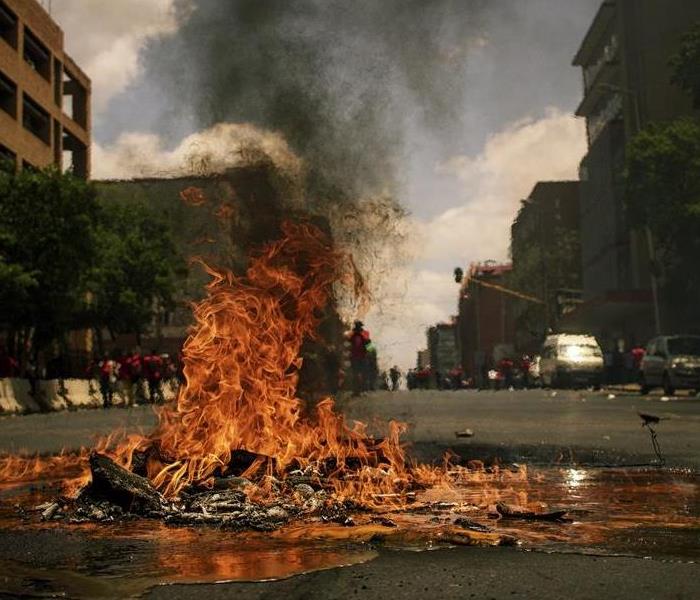 Smoke Damage
Smoke Damage
In the restoration business, SERVPRO of Edgewater/Deale-Churchton/Lothian gets called to building fires on a regular basis. Did you know that smoke damage is treated differently? There are 4 main types that we treat:
- Wet Smoke. (Plastic and Rubber) Low heat, smoldering, pungent odor, sticky, and smeary. Smoke webs are more difficult to clean.
- Dry Smoke. (Paper and Wood) Fast-burning, high temperatures; heat rises; therefore, smoke rises.
- Protein Fire Residue. (Produced by evaporation of material rather than from a fire) Virtually invisible, discolors paints and varnishes, extreme pungent odor.
- Fuel Oil Soot. (Furnace puff backs) While “puff backs” can create havoc for homeowners, SERVPRO of Annapolis/Severna Park can, in most cases, restore the contents and structure quickly.
- Other Types. (Tear gas, fingerprint powder, and fire extinguisher residue) Special loss situations require special care.
SERVPRO of Edgewater/Deale-Churchton/Lothian technicians are IICRC trained to handle even the toughest of losses. The type of smoke may greatly affect the restoration process, but trust professionals to make it “Like it never even happened.”
How to Choose the Appropriate Fire Extinguisher
11/4/2020 (Permalink)
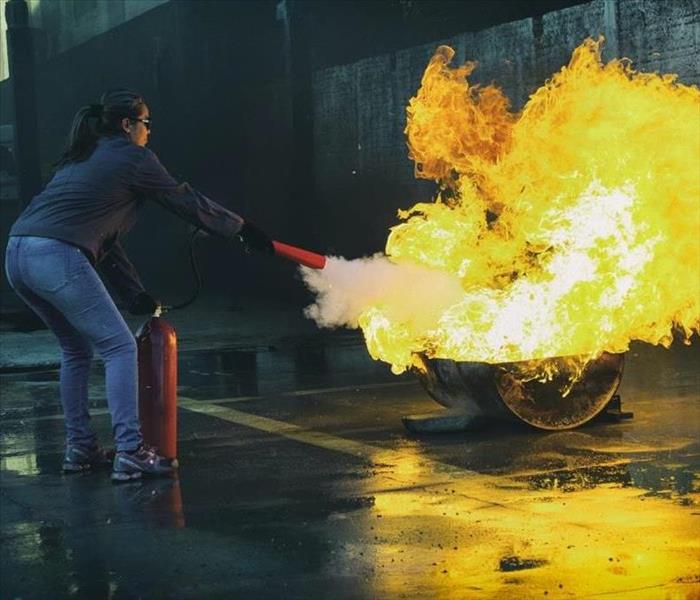 Fire Extinguisher
Fire Extinguisher
SERVPRO of Edgewater/Deale-Churchton/Lothian sees a lot of fires. Many fires start in the kitchen and might be easily extinguished if the property owner had a fire extinguisher. We’ve come up with the following list so you can select the best fire extinguisher for your property:
- Class A: This is the most common extinguisher and can be used to put out fires in ordinary combustibles such as cloth, wood, rubber, paper, and many plastics.
- Class B: Used on fires involving flammable liquids, such as grease, gasoline, and oil.
- Class C: Designed for fires involving appliances, tools, or other equipment electronically energized or plugged in.
- Class D: For use on flammable metals; often specific for the type of metal in question. These are typically found in factories.
- Class K: Intended for use on fires that involve vegetable oils, animal oils, or fats in cooking appliances. Generally found in commercial kitchens.
The fall season brings cooler temperatures, beautiful colors, and an abundance of outdoor activities. Plan ahead this season to help ensure it is safe and fire-free.
4 Tips to Prevent Fall Fires
10/13/2020 (Permalink)
 Fall Decorations
Fall Decorations
The fall season brings brilliant colors and cooler temperatures to Anne Arundel County. Retailers all over the area are offering you pumpkin-flavored items and autumn decorations.
In October of 2019, SERVPRO of Pasadena/Gibson Island/Lake Shore was called to a Pasadena house fire that started from a pumpkin-scented candle. So, this year, we’d like to give you 4 tips to help you keep your fall fire free.
- Fall decorations, like dried flowers and cornstalks, are highly flammable. Keep these and other decorations away from open flames and heat sources, including light bulbs and heaters.
- Keep emergency exits clear of decorations so nothing blocks escape routes.
- Teach children to stay away from open flames. Be sure they know how to stop, drop, and roll if their clothing catches fire.
- Remember safety first when choosing a Halloween costume. Consider avoiding billowing fabric.
The safety of your family and property is your top priority. If your home suffers fire, smoke, or soot damage this fall, trust our team of IICRC certified professionals to clean and restore your property…”Like it never even happened.”
Fire Prevention Week 2020
9/17/2020 (Permalink)
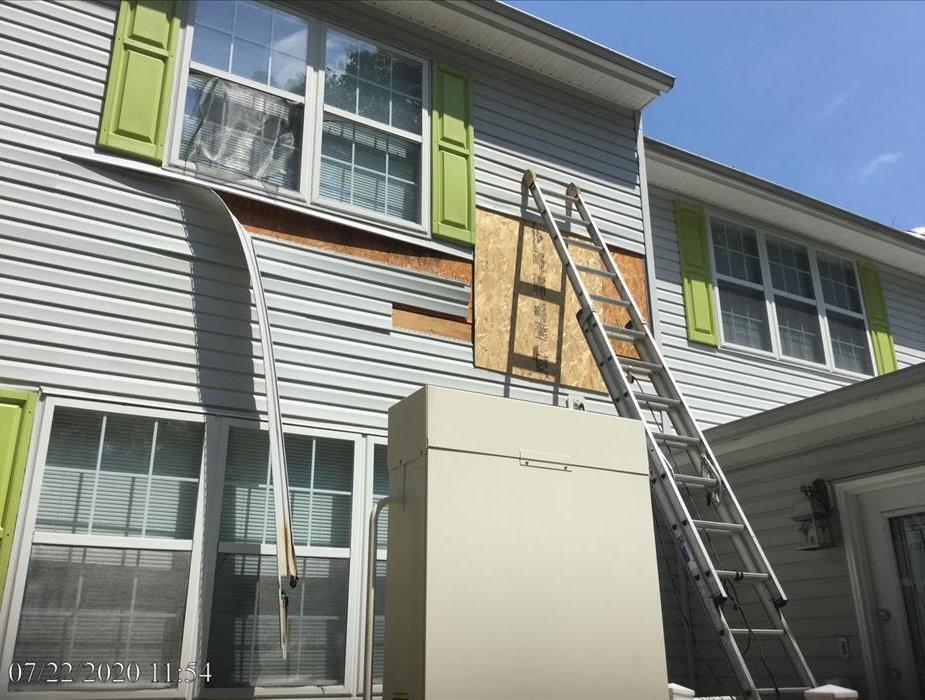 Fire Damage
Fire Damage
Fire Prevention Week 2020 begins on Sunday, October 4 and ends on Saturday, October 10. Does your family have a fire evacuation plan?
To ensure the fastest emergency evacuation plan, consider the following:
- Start your fire evacuation plan with a map. This map should include locations of exits, assembly points, and equipment (such as fire extinguishers) that may be needed in an emergency. Households with children should consider drawing a floor plan of your home, marking two ways out of each room, including windows and doors. Also, mark the location of each smoke alarm.
- A closed door may slow the spread of smoke, heat and fire. Install smoke alarms in every sleeping room, outside each sleeping area and on every level of the home.
- When you walk through your plan, check to make sure the escape routes are clear and doors and windows can be opened easily.
- Choose an outside meeting place (i.e. neighbor's house, a light post, mailbox, or stop sign) a safe distance in front of your home where everyone can meet after they've escaped. Make sure to mark the location of the meeting place on your escape plan.
- Go outside to see if your street number is clearly visible from the road. If not, paint it on the curb or install house numbers to ensure that responding emergency personnel can find your home.
- Have everyone memorize the emergency phone number of the fire department. That way any member of the household can call from a neighbor's home or a cellular phone once safely outside.
Now that you have your plan in place, make sure you practice it every year.
Why is Candle Smoke Flammable?
2/21/2020 (Permalink)
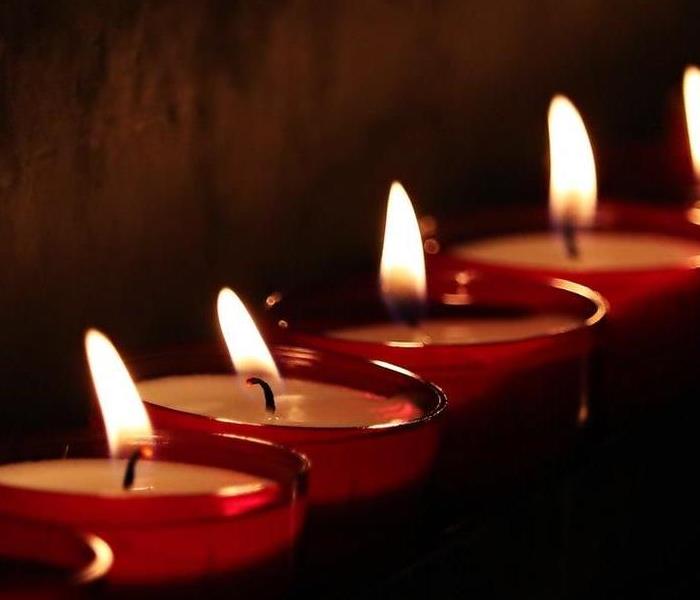 Tea Candles
Tea Candles
The cheapest and most widely used candle is made of paraffin—which is derived from petroleum. When burned, it releases a toxin called toluene, which has been found to cause DNA strand breakdown, affecting the nervous system.
When you are burning a candle, you are essentially vaporizing the liquid wax into a gas that is flammable. This vapor can then be used as fuel for the candle flame. It is this vaporized wax that fuels all candle flames used with conventional wax-based candles. Click here to read more.
Smoke from candles is actually soot. Smoke is just soot and other particulates carried on the hot air rising off the flame. When you put the top on a jarred candle and trap the smoke, it cools. And, the particulates in the candle settle onto the candle and the inside walls of the jar.
Fireplaces, cigarettes and the burning of candles can all result in soot stains on walls. Though soot collects on other surfaces in the home, soot stains are easy to spot on light-colored walls. Aside from being unattractive, soot can create a health hazard.
In general, candles won’t set off your smoke alarm. However, they can cause a fire. SERVPRO of Edgewater/Deale-Churchton/Lothian has provided fire damage remediation and reconstruction to several properties where candles were the cause of the fires.
Residential Fire Damage
1/8/2020 (Permalink)
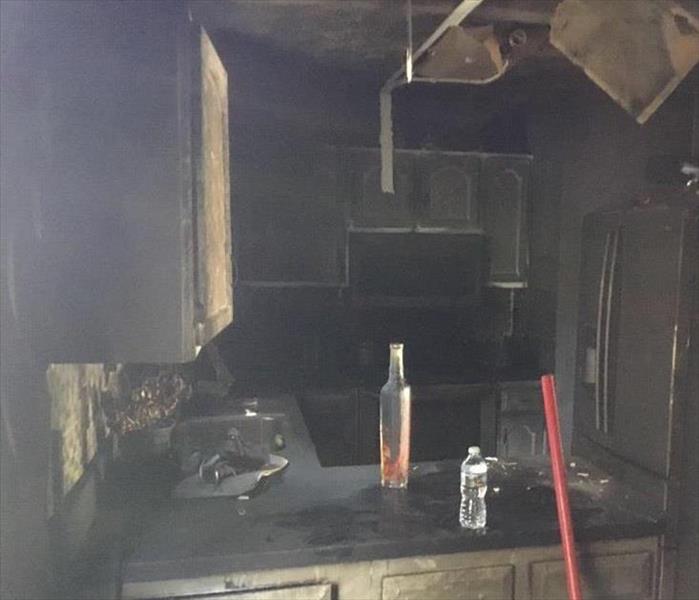 Kitchen Fire
Kitchen Fire
SERVPRO of Edgewater/Deale-Churchton/Lothian performed fire restoration and reconstruction services on this home after it suffered tremendous fire damage. We can work with your insurance company to get your home restored as quickly and efficiently as possible.
Here are some recommendations on what you can do until help arrives:
- Limit movement in the home to prevent soot particles from spreading and additional damage from occurring.
- Place clean towels or old linens on rugs and high traffic areas and upholstery.
- Coat chrome faucets, trim and appliances with petroleum jelly or oil.
- Place aluminum foil or wood blocks between furniture legs and wet carpet.
- Do not wash any walls or painted surfaces.
- Do not shampoo carpet or upholstery.
- Do not clean any electrical equipment.
- Do not send clothing to a dry cleaner since improper cleaning may set smoke odor.
SERVPRO of Edgewater/Deale-Churchton/Lothian has national accounts with many insurance companies, including Metlift, Homesite, Erie, Travelers and more. Our estimators and project managers can work with policy holders, agents, and adjusters to make an insurance claim as seamless as possible.
Our primary focus is to help make it… “Like it never even happened.”
Holiday Fire Emergency Tips
12/6/2019 (Permalink)
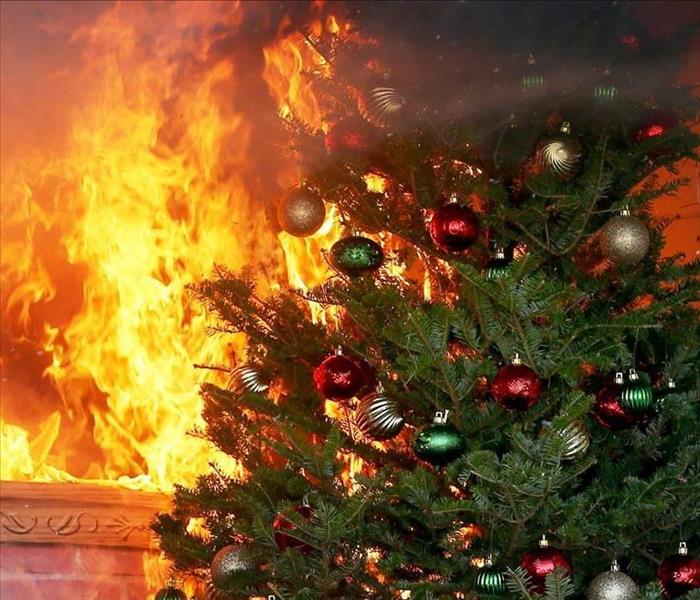 Christmas Tree Fire
Christmas Tree Fire
SERVPRO of Edgewater/Deale-Churchton/Lothian has the specialized fire restoration training needed to restore your home/business and property to pre-fire condition.. A fire is always difficult and especially during the holiday season. Here’s a few holiday emergency tips to keep your property safe:
- Keep space heaters on a single electrical cord and at least three feet away from flammable objects.
- Check the water in your tree every day. A dry tree Is very flammable.
- Before guests arrive for the holidays, check your smoke alarm batteries.
- Get your chimney checked by a professional before lighting the fireplace.
- Keep candles away from flammable materials, better yet use flameless candles.
- Unattended cooking is the leading cause of house fires.
- Keep an eye on what you fry! Most cooking fires start when frying food.
- During the holidays, do not overload extension cords.
- Always turn off holiday lights at night or when you leave your home or office.
Be fire smart as you deck the halls this season! Give the gift of emergency preparedness, develop a SERVPRO of Edgewater/Deale-Churchton/Lothian Emergency Ready Profile (ERP).
What To Do With Fire and Smoke Damage
10/31/2019 (Permalink)
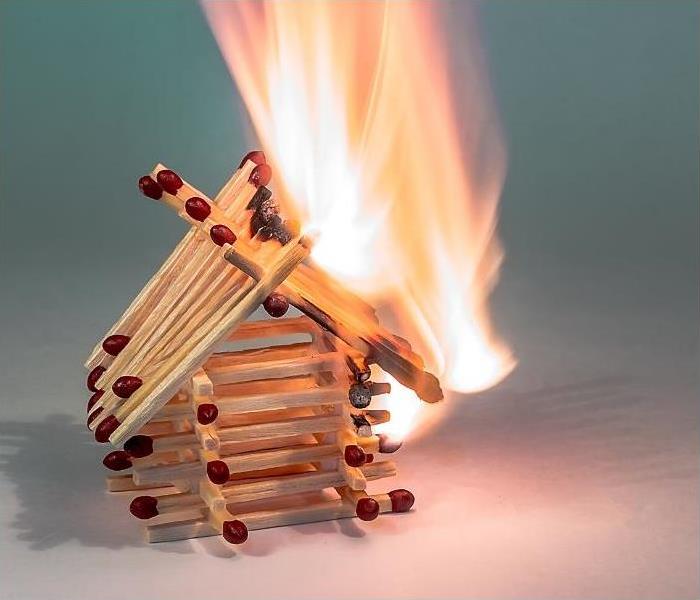 Fire and Smoke
Fire and Smoke
SERVPRO of Edgewater/Edgewater/Deale-Churchton/Lothian has the specialized fire restoration training needed to restore your property to pre-fire condition. Click here to review our complete fire damage restoration process. Every fire is different, and smoke and soot creates a unique type of damage.
Here are 4 tips to keep in mind with fire and smoke damage:
- Limit movement in the home to prevent soot particles from being embedded into upholstery and carpet.
- Keep hands clean. Soot on hands can further soil upholstery, walls and woodwork.
- If electricity is off, empty your freezer and refrigerator completely and prop doors open to help prevent odor.
- Wipe soot from chrome on kitchen and bathroom faucets, trim and appliances, then protect these surfaces with a light coating of lubricant.
Fires can happen at any time, day or night. The most important thing is quick response time. That’s why SERVPRO of Edgewater/Edgewater/Deale-Churchton/Lothian is available 24 hours a day/7 days a week.
How Do Smoke Detectors Work?
10/7/2019 (Permalink)
 Smoke Detector
Smoke Detector
October 6 – October 12 is Fire Prevention Week and smoke detectors play a huge role in preventing loss and injury with property fires. SERVPRO of Edgewater/Deale-Churchton/Lothian wants to know how smoke detectors really work. So, we’ve done some research.
First, there are 2 common types of smoke detectors: ionization detectors and photoelectric detectors. Most smoke alarms use these types of detection as well as heat to warn of a fire.
Ionization Smoke Detectors have a chamber and a source of ionizing radiation. If smoke enters the ionization chamber, the smoke particles attach to the ions and neutralize them, so they do not reach the plate. The drop in current between the plates triggers the alarm.
Photoelectric Detectors contain a T-shaped chamber with a light-emitting diode (LED) that shoots a beam of light across the horizontal bar of the T. When smoke blocks the light beam, the reduction in light reaching a photocell triggers the alarm.
So, which type of smoke detector do you need for your property? Both ionization and photoelectric detectors are effective smoke sensors. Both types of smoke detectors must pass the same test to be certified. Ionization detectors respond more quickly to flaming fires with smaller combustion particles; photoelectric detectors respond more quickly to smoldering fires.
To learn more about the type of smoke detectors your property needs, refer to Maryland Law.
Create a Fire Evacuation Plan
9/20/2019 (Permalink)
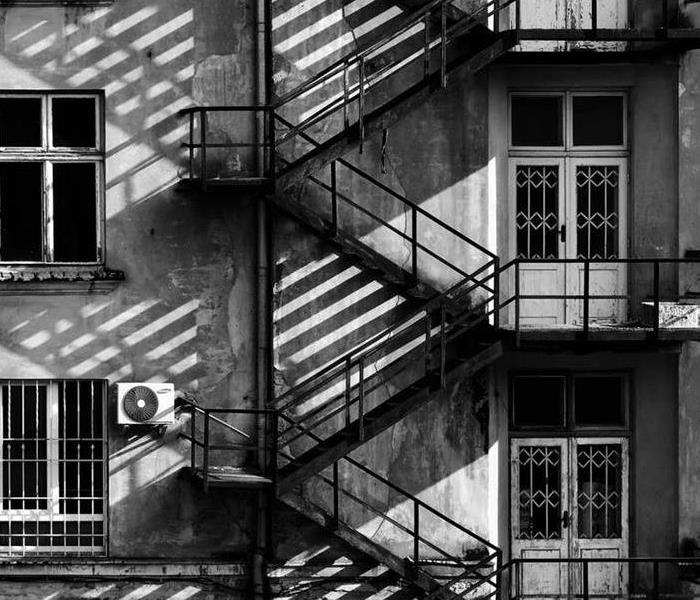 Evacuation Fire Escape
Evacuation Fire Escape
October 6 – 12, 2019 is National Fire Prevention Week.
In a fire, mere seconds can mean the difference between a safe escape and a tragedy. Fire safety education isn’t just for children. Teenagers, adults, and the elderly are also at risk in fires, making it important for every member of the community to take some time during Fire Prevention Week to make sure they understand how to stay safe in case of a fire.
A wide variety of emergencies both man-made and natural, may require a workplace to be evacuated. These emergencies include - fires, explosions, floods, earthquakes, hurricanes, tornadoes, toxic material releases, radiological and biological accidents, civil disturbances and workplace violence.
To ensure the fastest emergency action plan, consider the following:
- Similar to a home fire drill, start your fire evacuation plan with a map. These maps should include locations of exits, assembly points, and equipment (such as fire extinguishers, first aid kits, spill kits) that may be needed in an emergency.
- Many employers designate individuals as evacuation wardens to help move employees from danger to safe areas during an emergency. Generally, one warden for every 20 employees should be adequate, and the appropriate number of wardens should be available at all times during working hours.
- Certain equipment and processes must be shut down in stages or over time. Establish a method for accounting for non-employees such as suppliers and customers.
For more information on workplace evacuation plans and procedures, visit www.osha.gov.
Emergency situations are an unfortunate reality in workplaces and homes. If your prepared for these events, your employees and families are more likely to be protected.
SERVPRO of Pasadena/Gibson Island/Lake Shore is a woman-owned independent franchise. For more information, call (410) 255-1100.
Why are Space Heaters so Dangerous?
2/21/2019 (Permalink)
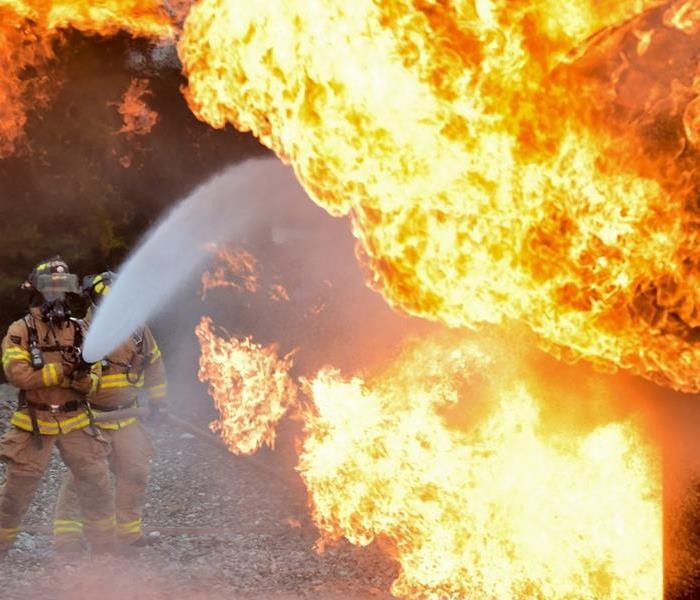 Prevent Space Heater Fires
Prevent Space Heater Fires
When the cold winter weather hits, many people turn on space heaters. Generally speaking, space heaters are safe to use. Fires occur mostly when space heaters are used improperly. According to the National Fire Protection Association, space heaters account for 43% of home heating fires. Here are some tips to ensure you use your space heater properly:
Use an electric space heater. Iowa State University Department of Agricultural and Biosystems Engineering warns that space heaters that use kerosene, propane, and natural gas pose an additional risk of releasing carbon dioxide (CO2), carbon monoxide (CO), and nitrogen dioxide into the air if they aren't properly vented, which can lead to serious health problems and even death. Electric space heaters (when used properly) are always a safer device for indoor heating.
Plug your space heater directly into the wall outlet. Never plug your electric space heater into an extension cord or power strip. Space heaters are often the cause of electrical fires because they overload a circuit.
Move your space heater away from clutter. Always keep your space heater at least 3 feet away from any furniture or combustible items (including bedding and curtains). Remember to instruct children to remain 3 feet away from the heater too.
Turn your space heater off. Whenever you leave the room or go to sleep, it is important to turn your space heater off. Unplug the heater when it’s not in use by pulling the plug straight from the outlet. Check the cord for damage periodically, and don’t use it if it’s frayed or worn.
Space heaters are not dangerous if they are properly used. Keep these safety tips in mind to prevent fire in your property.
How to Train Employees for Fire Safety
12/28/2018 (Permalink)
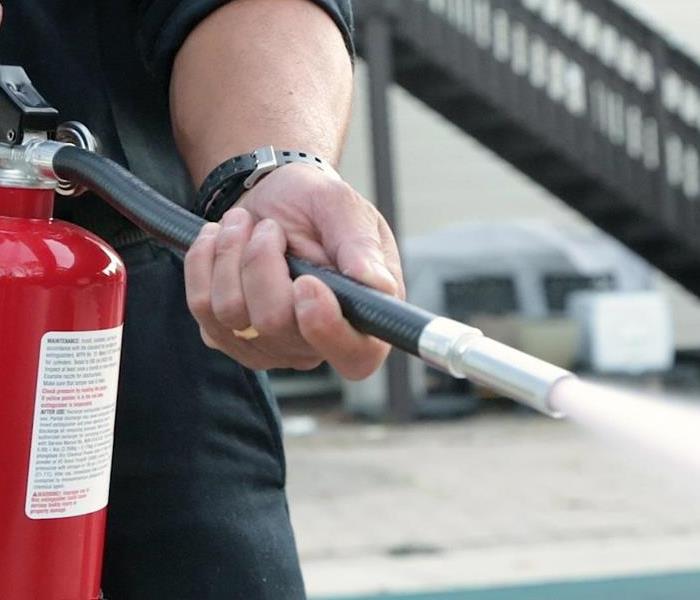 Practice Fire Safety
Practice Fire Safety
At SERVPRO of Edgewater/Deale-Churchton/Lothian we restore buildings after fires have taken place. We encourage you to train your employees on some basic fire safety techniques on an annual basis.
Here’s a quick list of some techniques you should use.
Fire extinguisher training should be done on an annual basis, at least, and should also be part of the initial training for new employees.
The P.A.S.S Technique
If employees aren't confident they can safely put out a fire, they should evacuate instead. The acronym P.A.S.S. helps employees remember each step of using an extinguisher to reduce fire damage.
- Pull the pin. Find the pin at the top of the canister and pull it out to break the tamper seal.
- Aim the nozzle at the base of the fire. When the source of water is doused, the flames should die down.
- Squeeze the handle to release the pressurized chemicals inside the canister.
- Sweep the spray from side to side, maintaining your focus at the base of the fire.
After working through the steps, keep your eye on the area. If flames reappear, repeat steps 2 to 4.
Annual Fire Response Drills
Use the following steps in case of a fire (and during yearly drills.)
Pull the fire alarm and alert the fire department.
Protect the designated evacuation path. If fire, heat, or smoke threatens to come between employees and the exit, personnel should evacuate instead of fighting the fire.
Choose an appropriate extinguisher.
Complete the P.A.S.S. technique.
Observe the location of the fire to catch any flames that may reignite.
Evacuate immediately if the fire is too big, if the air isn't safe to breathe, if the room is too hot or smoky, and/or if the evacuation path is compromised.
Once the ability to use the fire extinguisher has been mastered and employees have been trained in the fire response routine, schedule opportunities for employees to practice their responses to a fire.
Practice Safety
It doesn't take long for a kitchen fire to pop up in a restaurant or flames to appear in an industrial setting. Protect your employees with training on how to use a fire extinguisher and regular drills in fire safety techniques.
Christmas Tree Safety
12/3/2018 (Permalink)
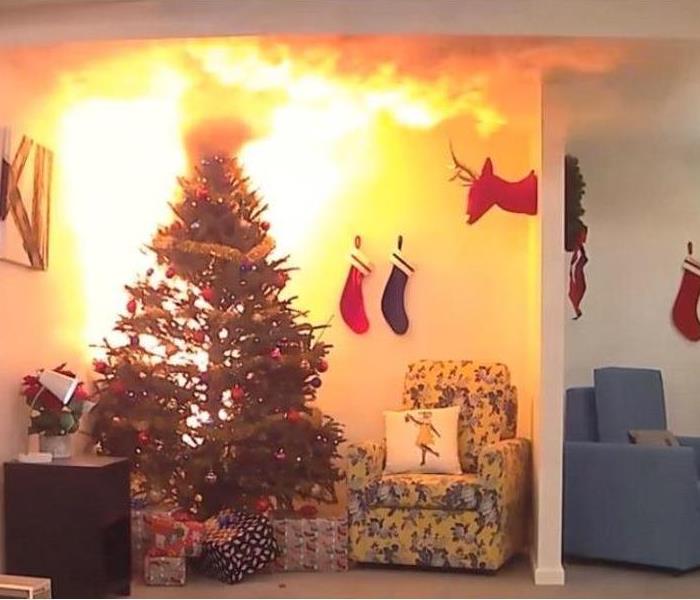 Christmas Tree Fire
Christmas Tree Fire
Edgewater and Anne Arundel County has seen it’s share of tragedies caused by Christmas tree fires. As your family decks the halls this holiday season, SERVPRO of Edgewater / Deale-Churchton / Lothian encourages you to consider the following Christmas tree safety tips.
Selecting your Christmas Tree. Pick a tree with fresh, green needles that do not fall off when touched.
Setting up the tree. Before placing the tree in the stand, cut 2” from the base of the trunk. Make sure the tree is at least three feet away from any heat source, like fireplaces, radiators, candles, heat vents or lights. Make sure the tree is not blocking an exit. Add water to the tree stand and be sure to add water daily.
Lighting the tree. Use lights that have the label of a recognized testing laboratory. Some lights are only for indoor or outdoor use. Replace any string of lights with worn or broken cords or loose bulb connections. Read manufacturer’s instructions for number of light strands to connect. Never use lit candles to decorate the tree. Always turn off Christmas tree lights before leaving home or going to bed.
Additionally, after Christmas, get rid of your tree! Dried-out trees are a fire danger and should not be left in the home or garage, or placed outside against the home. Christmas trees must be free from all lights, ornamentation and tree bags in order to be picked up by Anne Arundel County Waste Management. Only natural trees will be collected and tall trees should be cut in half in order to fit into the collection truck. Click here for more information on Anne Arundel County Yard Waste.
Does Your Insurance Cover You in the Event of a Fire?
10/27/2018 (Permalink)
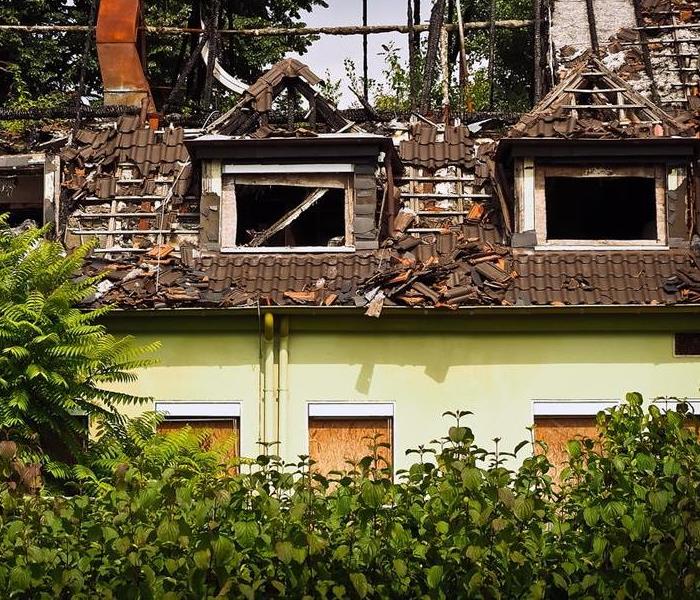 Fire Damage
Fire Damage
Hopefully, you’ve never been through a home or office fire in Edgewater, Maryland. However, as part of being prepared for the unexpected, it’s important to make sure your insurance (home or renters), can protect your family and business in care of a fire.
You probably know someone who has been through a home fire. They are eager to share lessons learned the hard way. One of those lessons is that insurance can help protect your family financially if a fire should affect your home.
Here are a few ways renter’s insurance can help protect you from fire damage:
- Protect personal property. Your landlord’s insurance will cover the building and items that belong to the landlord, but your items are not included in that coverage. As a renter, you need a policy to provide replacement value of personal property lost from fire damage.
- Prevent financial destruction from liability. Most renter’s insurance policies include protection in case you accidentally start the fire. Of course, this doesn’t cover intentional or criminal conduct.
- Provide money for accommodations. Make sure your policy includes this coverage, which provides for hotel fees or the expense of relocation. A loss of use can help pay for you to live somewhere else if your current space becomes uninhabitable from a disaster, like fire.
Renters insurance is affordable, costing around $30 per month. It provides coverage of your belongings no matter where they are damaged or stolen, and it covers a variety of different types of disasters. Be sure to remember that flood damage still requires separate coverage, but fire and other disasters, such as wind, lightning, theft and vandalism, are usually covered. Coverage may have some limits, so consider getting a rider for special items that may be very valuable. It’s up to the landlord to have adequate coverage for the building and any furnishings that are included. Fire restoration can encompass many different types of damage including water, smoke and soot. A good restoration company will be able to handle all types of damage, working with you to minimize loss and clean your belongings when it is possible to do so.
Fire Prevention Week (October 7 – October 13, 2018)
10/5/2018 (Permalink)
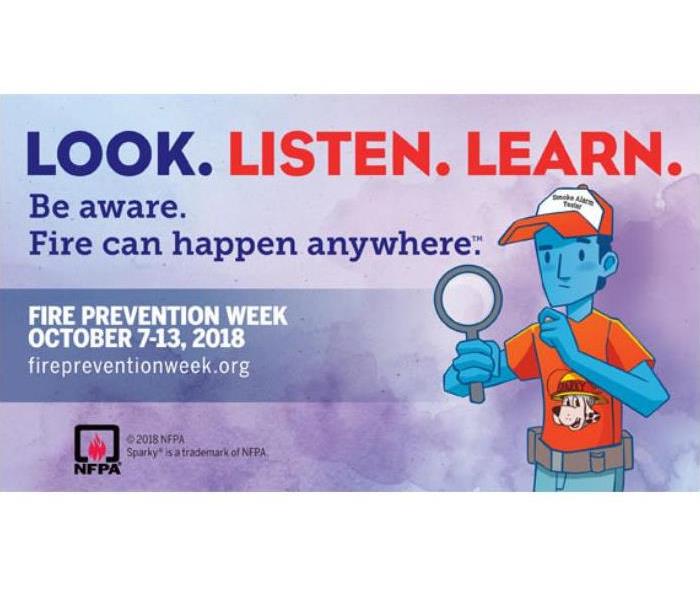 Fire Prevention Week
Fire Prevention Week
SERVPRO of Edgewater/Deale-Churchton/Lothian often receives calls to help when a fire occurs in Anne Arundel County Maryland. So, we thought we should take the time to talk about Fire Prevention Week. The purpose of Fire Prevention Week is to bring awareness to the risk of death in case of a fire and provide educational resources to people of all ages, races and socioeconomic status in order to keep everyone safe. This year’s campaign, “Look. Listen. Learn. Be aware. Fire can happen anywhere,” works to educate people about three basic but essential steps to take to reduce the likelihood of having a fire––and how to escape safely in the event of one:
- LOOK for places fire could start. Take a good look around your home. Identify potential fire hazards and take care of them.
- LISTEN for the sound of the smoke alarm. You could only have minutes to escape safely once the smoke alarm sounds. Go to your outside meeting place, which should be a safe distance from the home and where everyone should go to meet up.
- LEARN two ways out of every room and make sure all doors and windows leading outside open easily and are free of clutter.
We hope your home and/or business never suffers from a fire, but if you do, we are here to help. Contact SERVPRO of Edgewater/Deale-Churchton/Lothian at (410) 867-3590.
Pasadena Home Fire
9/19/2018 (Permalink)
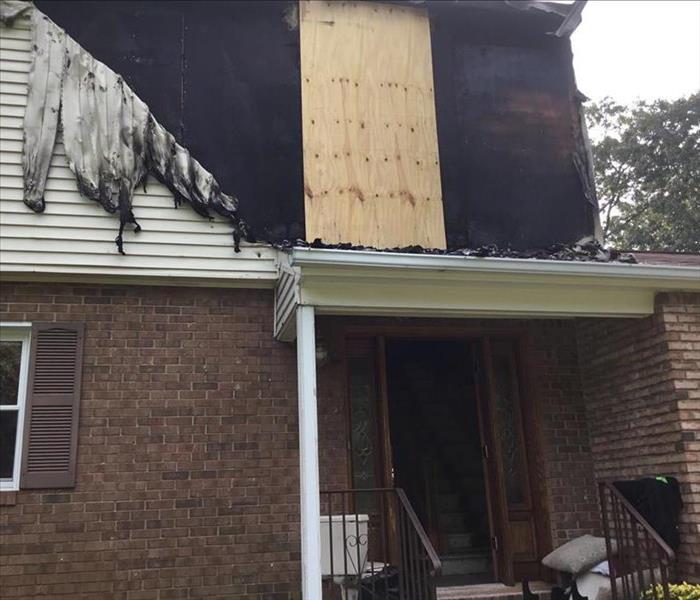 Pasadena Home Fire
Pasadena Home Fire
On August 18, 2018, a homeowner in a Pasadena neighborhood contacted SERVPRO of Edgewater/Deale-Churchton/Lothian about a house fire. The source of was caused by a grease fire that started in the kitchen.
The homeowner mistakenly attempted to extinguish the fire with water rather than with a kitchen rated fire extinguisher or baking soda. Once the fire department saved the day, further clean-up was required because the product and water used to put the fire out. The home was severely damaged and required boarding up the door and windows.
Our SERVPRO of Edgewater/Deale-Churchton/Lothian team immediately began working on both the fire and water damage. Itemizing each affected item or structural damage, we removed all unsalvageable items from the property and the items that could be salvaged were packed and moved to our warehouse in Arnold.
Our crew at the warehouse has been working on cleaning the items that were salvaged utilizing ultrasonic machine cleaning methods. Using both wet and dry-cleaning techniques to clean contents, upholstery and furniture, we have been able to restore most materials to their preloss condition.
Mulch Fires in Harwood
4/20/2018 (Permalink)
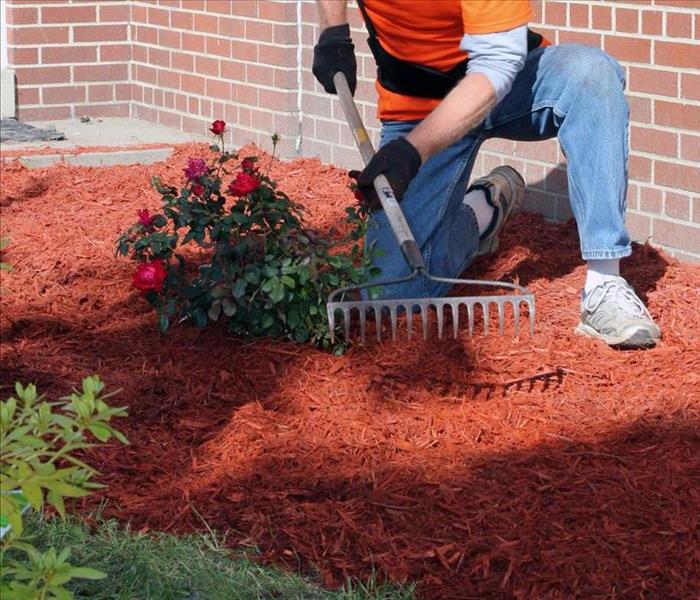 Decorative mulch is an unsuspecting place where fires can start.
Decorative mulch is an unsuspecting place where fires can start.
There was a day or two of sunny weather in Galesville last week. Many homeowners took to cleaning up their yards and front porches. Cleaning up the flower beds was a big part of the yard cleanup at our house and that meant lots of mulch.
What many people do not know is that mulch is a combustible material and can easily be ignited. Hundreds of fires start this way each year according to Fire Engineering. Large mulch piles have been known to build up enough heat from internal decomposition and start a fire. Keeping mulch moist and raked is an effective way to prevent this from happening.
It is also important that cigarettes and matches are properly extinguished to avoid igniting mulch.
Fire cleanup is no easy task, SERVPRO of Edgewater/Deale-Churchton/Lothian are your fire restoration professionals.
February Temperatures Still Freezing
2/1/2018 (Permalink)
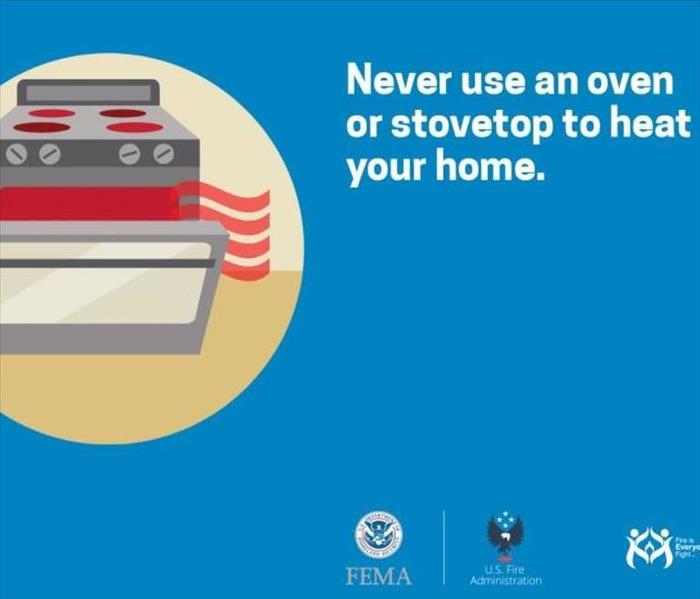 FEMA is a great resource for Edgewater and Lothian residents.
FEMA is a great resource for Edgewater and Lothian residents.
When the outside temperatures are still lingering at and below freezing in the Edgewater area, heat is on most people’s minds. Having your heating units serviced at the beginning of each winter season is a good way to get ahead of any issues. This does not guarantee that you will not have any heating issues but if you do, make sure to follow these tips to prevent fires.
- Never use an oven or stove top to heat your home
- Always use a metal or heat tempered glass screen when using a fireplace
- All heater should have 3 feet on each side
Our IICRC certified technicians are available now to help with frozen pipes, water or fire damage at 410.867.3590.
Overloaded outlets can spark electrical fires
12/20/2017 (Permalink)
 Festive yards in Galesville and West River need to take precautions to avoid electrical fires.
Festive yards in Galesville and West River need to take precautions to avoid electrical fires.
Frosty, Olaf, a reindeer, Santa, The Polar Express are all on the same front lawn in Mayo. Lite up and blowing in the wind. Driving by it looks wonderful and brings smiles to everyone’s face, but can that be dangerous? All those cords plugged in to the same house is reason to pause.
All the lights and decorations are joyous only if they are installed safely.
The top there safety tips to follow when using lights outside are:
- Purchase certified and lab tested cords
- Make sure they are rated for outdoor use
- Do not use multiple plug outlets chained together
The Electrical Safety Foundation International (ESFI) has other great safety tips that will help limit your holiday fire risk. SERVPRO of Edgewater/Deale-Churchton/Lothian will have crews working throughout the holiday if you find yourself in need of smoke, soot or fire damage repair.
Don't let your Edgewater Christmas Tree Dry out
12/4/2017 (Permalink)
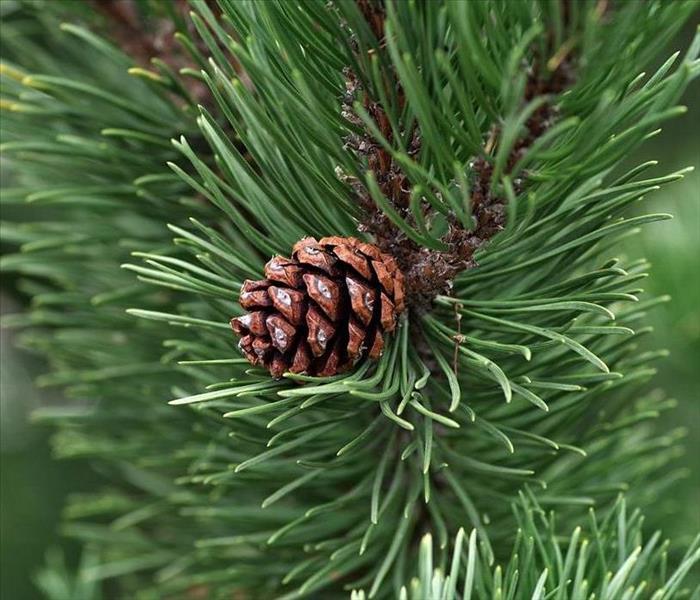 Fire Damage from a dry tree can be serious in Edgewater homes.
Fire Damage from a dry tree can be serious in Edgewater homes.
For many folks in Deale, Churchton or Lothian last weekend included putting up the Christmas Tree. This is a festive time of year, but also a time to remember some safety tips.
At SERVPRO of Edgewater/Deale-Churchton/Lothian we rely on the National Fire Protection Association for key fire safety tips. They recommend the following:
- Keep tree at least 3 feet from a heat source
- Be sure to add water to tree daily
- Make sure lights are not broken or have frayed cords
- Turn off holiday lights before bed or when leaving the home
Most importantly is to get rid of the Christmas tree once it is dried out. Removing the dead tree from the home and garage is the best prevention for accidental holiday fires.
SERVPRO of Edgewater/Deale-Churchton/Lothian will be available all holiday season to assist with any smoke, fire or water damage needs. Call 410-867-3590 anytime!
Cooking Fires are the #1 Cause of Home Fires
11/7/2017 (Permalink)
 Harwood, Galesville and Deale crews are available 24/7/365.
Harwood, Galesville and Deale crews are available 24/7/365.
The holiday season is upon us and that means an increase in kitchen fires. Thanksgiving is the peak day for home cooking fires, followed by Christmas Day and Christmas Eve. Leaving items unattended, or forgetting items in the oven are the top causes of these incidents.
Top Safety Tips Include:
- Stay in kitchen when cooking on stovetop
- Set timer on phone and kitchen to alert before completion
- Keep kitchen towels and oven mitts away from fire source
- Never leave lit candles unattended
SERVPRO of Edgewater/Deale-Churchton/Lothian wants you to have a happy and healthy holiday. Our neighbor’s safety is important to us. If you find yourself or a friend in need of fire or water remediation we are available 24/7/365 to assist. Call 410.867.3590 anytime.
Gobble Gobble!
Fire Prevention Week
10/10/2017 (Permalink)
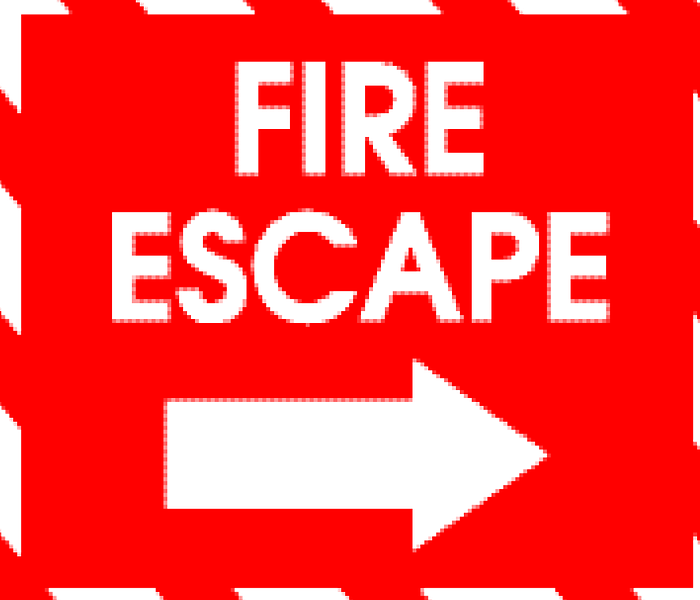 Fire Safety Planning can save lives.
Fire Safety Planning can save lives.
National Fire Protection Association has offered these tips during Fire Prevention Week, October 8-14,2017. Fire moves very fast, estimates say you have less than 2 minutes to get out safely.
- Draw a map of your home including all windows and doors
- Find two ways out of every room
- Clear path from all windows and doors
- Choose an outdoor meeting place away from the structure & Call 911
- Test your smoke alarm
- Practice your drill with the whole family
- Fine tune the plan based on the practice run
Remember that people cannot be replaced, nothing is as important as getting out safely. Once you can safely return to the home you can then think about calling for assistance with smoke, fire or water damage. The sooner you have SERVPRO professionals on site, the sooner they can begin the restoration process.
Edgewater Smoke and Soot Cleanup
8/29/2017 (Permalink)
Smoke and soot is very invasive and can penetrate various cavities within your home, causing hidden damage and odor. Our smoke damage expertise and experience allows us to inspect and accurately assess the extent of the damage to develop a comprehensive plan of action.
Smoke and soot facts:
- Hot smoke migrates to cooler areas and upper levels of a structure.
- Smoke flows around plumbing systems, seeping through the holes used by pipes to go from floor to floor.
- The type of smoke may greatly affect the restoration process.
Different Types of Smoke
There are two different types of smoke–wet and dry. As a result, there are different types of soot residue after a fire. Before restoration begins, SERVPRO of Edgewater/Deale-Churchton/Lothian will test the soot to determine which type of smoke damage occurred. The cleaning procedures will then be based on the information identified during pretesting. Here is some additional information:
Wet Smoke – Plastic and Rubber
- Low heat, smoldering, pungent odor, sticky, smeary. Smoke webs are more difficult to clean.
Dry Smoke – Paper and Wood
- Fast burning, high temperatures, heat rises therefore smoke rises.
Protein Fire Residue – Produced by evaporation of material rather than from a fire
- Virtually invisible, discolors paints and varnishes, extreme pungent odor.
Our Fire Damage Restoration Services
Since each smoke and fire damage situation is a little different, each one requires a unique solution tailored for the specific conditions. We have the equipment, expertise, and experience to restore your fire and smoke damage. We will also treat your family with empathy and respect and your property with care.
Have Questions about Fire, Smoke, or Soot Damage?
Call Us Today – 410-647-8181
Christmas Tree Fires
11/30/2015 (Permalink)
 Christmas Tree Fires
Christmas Tree Fires
Statistics from the National Fire Protection Association (NFPA) show the holidays are a high-risk time for home fires. Christmas trees are responsible for 240 home fires each year, and other holiday decorations are the cause of another 1,170 fires.
Here are some tips to keep your home safe this holiday season:
•Check the stand daily to make sure that the level of water does not go below the base of the tree.
•Keep trees at least three feet away from major sources of heat (fireplaces, heaters, heat vents, and direct sunlight). Lowering the room temperature will slow the drying process.
•Use lights that produce low heat, such as miniature lights, to reduce drying of the tree.
•Always inspect light sets before placing them on the tree. If worn, replace with a new set.
•Do not overload electrical circuits.
•Always turn off the tree lights when leaving the house or when going to bed.
•Monitor the tree for freshness. After Christmas or if the tree is dry, remove it from the house.
•Install and ensure smoke alarms work inside and outside each bedroom and sleeping area. Install alarms on every level of the home, including the basement.
If you have a fire, call SERVPRO of Edgewater/Deale-Churchton/Lothian. We make it like it never even happened.
Holiday Fire Prevention
11/23/2015 (Permalink)
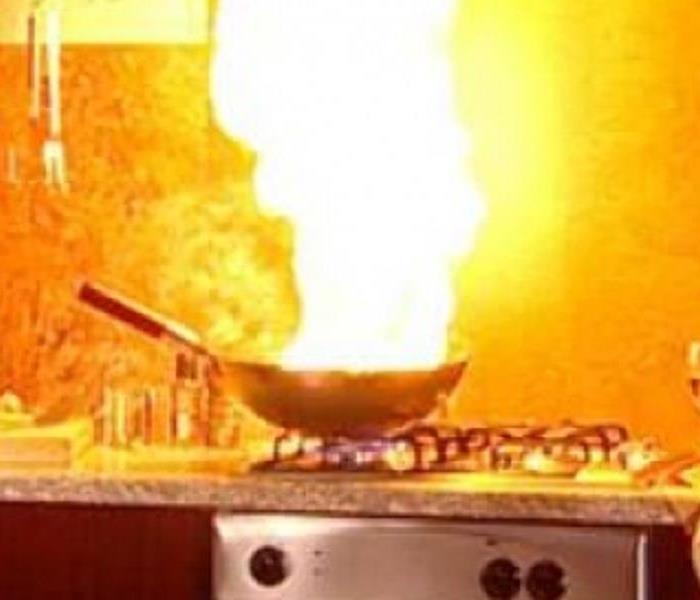 Holiday Fire Prevention
Holiday Fire Prevention
The approaching holiday season brings traditions, parties, shopping, entertaining – and potential danger.
The latest statistics available from the National Fire Protection Association (NFPA) show the holidays are a high-risk time for home fires. Thanksgiving Day sees almost a threefold increase in cooking-related fires.
“No one wants to think about the possibility of losing their home, and even more tragically, lives because of a fire during the holidays,” said Rick Isaacson, Executive Vice President of SERVPRO Industries, Inc. “But statistics show, it’s important to be aware of the increased risk seasonal decorating, entertaining and cooking can cause during the holidays.”
Isaacson reminds homeowners that prevention and common sense can help keep homes and families safe during the holidays and throughout the year. Here are some sobering facts about holiday fires and tips to help keep your home, friends and family safe throughout the holiday season.
Holiday Decoration Fire Facts
45% of all holiday fires involve candles; that number rises to 56% in December. Use flameless candles. If you do use traditional candles, burn them in sturdy candleholders, well Cooking Fire Facts
Cooking fires on Thanksgiving Day exceed the daily average by 272%. Supervise items on the stovetop. 58% of kitchen fires involve ranges; homes with electric cooktops have a higher risk of fire than homes with gas cooktops.Keep flammable items – potholders, packaging, wrapping, wooden utensils, loose clothing – away from the stovetop. And, don’t let lack of sleep or alcohol consumption affect your ability to concentrate on preparing the meal.“It only takes a moment’s distraction or carelessness to turn a holiday celebration into a catastrophe,” said Isaacson. “We hope these tips will be a reminder to families everywhere to make fire prevention a priority in their holiday preparations, so they can spend the season enjoying family and friends, not dealing with the aftermath of a fire.”
For more information and tips, visit http://www.nfpa.org/safety-information/for-consumers/seasonal/thanksgiving-safety
Fire and Smoke Damage Restoration Specialists
11/3/2015 (Permalink)
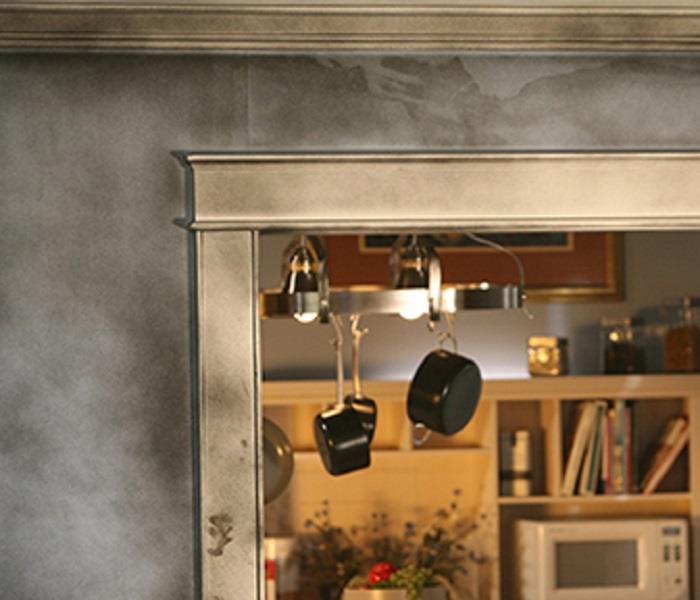 SERVPRO of Edgewater/Deale-Churchton/Lothian are experts in fire and smoke restoration.
SERVPRO of Edgewater/Deale-Churchton/Lothian are experts in fire and smoke restoration.
Why choose SERVPRO of Edgewater/Deale-Churchton/Lothian?
We are Faster to any Size Disaster
SERVPRO of Edgewater/Deale-Churchton/Lothian is dedicated to responding immediately when you need help with a fire or water damage event. A fast response lessens the damage, limits further damage, and reduces cost. We are available 24 hours and day, 7 days a week.
We are Fire and Water Damage Specialists
SERVPRO of Edgewater/Deale-Churchton/Lothian specializes in fire and water damage restoration. Our technicians have extensive training and equipment to get you back to pre-fire condition. Our technicians are experts in fire & smoke restoration, odor identification and removal, upholstery & fabric cleaning, and water damage restoration.
SERVPRO of Edgewater/Deale-Churchton/Lothian Offers:
· Inspection and Fire Damage Assessment
· Water Removal and Drying (if water damage is present)
· Removal of Smoke and Soot from All Surfaces
· Cleaning and Repair
· Restoration
We know how devastating a fire can be. Fire and water damage can leave your home unsafe and unlivable. We clean and restore your property using specialized equipment and cleaning techniques so you can get back to your life.
Call us today at 410-647-3590
“Like it never even happened.”
Fire Prevention Week
10/7/2015 (Permalink)
Fires can be especially devastating to your home or business. After the fire trucks leave, your property will likely suffer from not only fire and smoke damage, but also widespread water damage and flooding from firefighting efforts. SERVPRO of Edgewater/Deale-Churchton/Lothian has specialized fire and water damage restoration training and experience to quickly clean up and restore your home to pre-fire condition. We can remove the pervasive smoke odor and deep-clean soot from upholstery and carpet.
Statistics show that home fires claim the life of one child every day and approximately 16 children are injured from fires or burns every hour. Over 85% of all fire-related deaths are due to home fires, which spread quickly and often leave as little as 2 minutes to escape.
Fire safety tips:
Install smoke alarms on every level of your home and in every sleeping area.Teach kids to never play with matches and lighters and store these up and away from children.Create and practice a home fire escape plan with 2 ways out of your house. Teach your children to get low and get out when they hear the smoke alarm.Use common sense in the kitchen. Pay attention when cooking and never leave a hot oven or cooktop unattended.Helpful Links:
Check out the Red Cross fire safety checklist on their website.
National Fire Protection Association (NFPA)
Safety Tip Sheets
Do You Have Smoke or Fire Damage? Call Us Today (410) 867-3590






 24/7 Emergency Service
24/7 Emergency Service
























